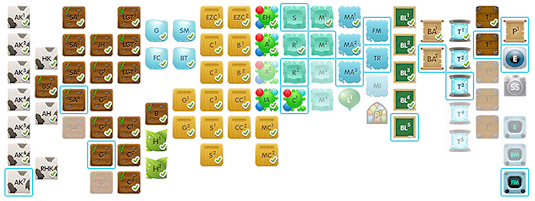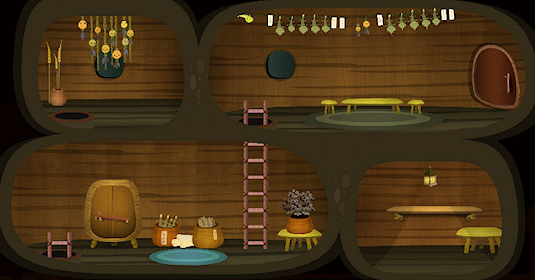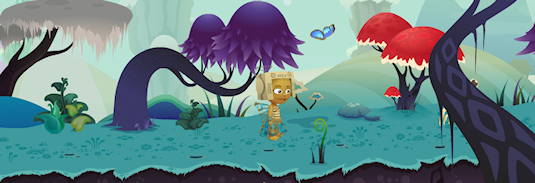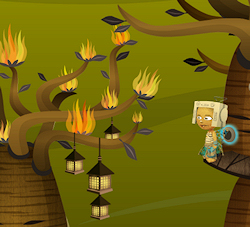
Most of the reviews I’ve read of Glitch have been relentlessly trendy, evoking poetry, trying to find deep meaning in a Flash game that involves tickling pigs and drinking cocktails and wise-cracking with magic rocks. Beau even called the game hipsterish, but honestly, I don’t see it. It’s a cute game. It’s a crafting sandbox. It’s what FarmVille would be if FarmVille weren’t boorish and utterly without challenge. I’m adoring Glitch, but it doesn’t need to exude “hip” to be worth playing. Can’t something just be cute and smart without being ironic?
The conceit of Glitch is that you’re a darling little “Glitch” wandering around in the imaginings of eleven giant-gods. There’s a lovely map filled with interesting locations that range from generic farmlands to swamps to straight up bizarre and comical homages to Dr Seuss. Because the game is a 2-D sidescroller, you pilot your character from left to right along interconnected streets running within and between each of these larger landscapes. The streets are populated with animals, trees, rocks, merchants, and shrines. At its most basic, gameplay consists of running along these streets, harvesting nodes, creating items from collected resources, and then either selling said items or donating them to shrines. Doing basically anything increases your experience, allowing you to level up and increasing your total mood and energy, which are juggled and replenished by your consumption of food, beverages, and potions. Failure to properly manage your energy will bring about your death and send you off to Hell, which is amusingly just another level from which you must emerge to pick up where you left off.
And if that’s all there were to Glitch, there’d be no point to writing anything about it. It isn’t a deep game, but it is an intriguing game, one meant for explorers and crafters and dabblers. There’s (effectively) no combat at all, but there is a massive achievement system that awards badges for basically everything you do. (I love the achievements — they remind me so much of girl scout badges.) Characters are developed through a convenient offline leveling system that will take casual players a few months to master (at least until new skills are added). In fact, it was the table-of-the-element-esque skill tree (and the promise of leveling while I’m away) that convinced me to play in the first place. How clever and cheerful is this?

The skills allow you to perform various actions, like planting crops, milking butterflies, digging ore, crafting food, pressing herbs, meditating, and even teleporting. The more you learn, the more quests you’re offered (yes, there are quests! Mostly exploration and crafting quests!) and the harder it is to learn more, meaning that you have to choose wisely and prepare for a game that’s meant to take a long time (at least offline) to master, although you can speed up your rate of skill acquisition by donating items to the giant-gods in mass quantities (and I do mean mass).
The types of skills and gameplay currently available ensure that the game is a crafting paradise. In fact, the crafting interface is one of the very best I’ve seen in any MMO (AAA games, take note). When you attempt to craft, say, Fried Noodles, the interface will prompt you to make any missing sub-components, like Plain Noodles, which themselves require Flour, nesting (seemingly) infinitely without forcing you to exit the tool and start up another tool or remember where it was you left off in the initial crafting process. It’s so simple, yet I can’t think of another game that does it so cleanly. The piles and piles of tools necessary for crafting are a bit tedious, though. In fact, the inventory system itself is annoying; in no time at all, I found myself clicking between all my bags, trying to find that stack of ham or emblem or cubimal. WTB the all-in-one inventories pioneered by WoW modding enthusiasts!
True to the sandbox genre, Glitch offers housing. It’s instanced housing, akin to housing collectives in Lord of the Rings Online, but it’s cute. Houses currently serve as a handy place to stash your excess stuff, farm crops and trees, and raise livestock. I was able to acquire the second-largest home in the game within a few days of playing, but large isn’t always better. Right now, houses aren’t particularly customizable, and some of the cheaper homes have more desirable perks (like herb gardens and rare trees), but Tiny Speck promises this will eventually change. (I’m still waiting for a home that will support my crops and an herb garden, hopefully in the swamps!) The team has also been continually releasing new housing blocks to the players, which is very much welcome. Some of the zones sold out the very first weekend after launch. When last I looked, there were only a few hundred vacant homes across the game, most of those too small and with too few features to be worth the purchase price. This housing crisis reminds me a bit of the situation for player cities in Star Wars Galaxies or medium homes on the larger LotRO severs or heck any housing in Ultima Online ever. In Glitch, the problem is exacerbated because there’s no reclamation process for homes purchased by Glitches who then leave the game.

Housing isn’t the only typical sandbox problem to plague Glitch. The economy is something of a trainwreck. The balance of craftable and harvestable items and energy management is such that there’s an oversupply of virtually everything, including money, in spite of the brilliant gold-and-item-sink of the shrines. All but the most casual players will find it simple to make what they need and never need to buy supplies from anyone else, so the auction hall, though cleanly integrated in the game and the browser, is practically a storage bin for excess stuff at prices that sometimes encourage clever Glitches to buy from players and then sell to the NPC vendors for a profit. There are a few items — a high-end soup, shrine powder, mining milkshakes — that sell for small profits, but it’s barely worth the trouble even just a few weeks into the game’s life. This is a deep disappointment to me, as I tend to play crafting games for merchant PvP.
And instead of trying to balance the game’s economy organically, Tiny Speck appears to be taking a heavy-handed approach. Among the first nerfs to the game were experience caps on food preparation, ostensibly intended to diversify the types of food being sold on the auction hall. Instead, the patch just diversified the types of foods being grinded and sold to vendors (or donated to shrines, the primary means of leveling once you’ve blown through all the quests) since there was still no profit to be made at the AH. In addition to being ineffective, that nerf in particular seems to violate the spirit of an open sandbox (why do I learn by making 20 soups but not 21? Why have arbitrary caps that encourage me to metagame, to log back in when the game-day resets and just pick up where I left off?).

Tiny Speck also seems afraid to simply let the players do what they’re meant to do in a sandbox: figure out their own solutions to social problems. Compare TvT (can I coin this? tree-vs.-tree combat?) and piggy-snatching. During the first few weeks of the game, groups of players “battled” to plant certain types of trees in certain public areas. Some players wanted more spice trees; some wanted gas trees. When one group would plant a public tree of one type, the other group would come in with tree poison, kill it, and plant the other type. New social groups formed to alert tree-huggers that local trees were under attack and needed a quick rescue by way of tree antidote. Note that Tiny Speck placed tree poison and antidote in the game, on purpose. Whether the company intended those for use only on private trees or it foresaw such public usage, I don’t know, but over time, the sides have settled down and come to an uneasy truce as the market has dictated the victor (not that it stopped either side from labeling the other “griefers”!).
Piggy-snatching, on the other hand, is one of those “tragedy of the commons” issues that Tiny Speck handled all wrong. By default, a small number of piggies roam some of the streets, waiting for someone to hug and nibble them. Players can, if they desire, craft piggy eggs and hatch them on other streets. But there also exists in game piggy lure, with which players can capture these free-range piggies, loosing them in their homes, selling them to vendors, or donating them to shrines. While the default piggies do respawn, players who willingly hatched extra piggies bemoaned those who were using the lure to capture the animals for their own profit. Thieves, such folk were labeled. And instead of saying, “Duh, stop putting free piggies on public streets” or encouraging players to use social pressure, communication, and coordination to keep the pig population up to those players’ desires, Tiny Speck just took away everyone’s ability to vendor and donate hog-tied pigs, end of story, end of debate, never mind that TS apparently thought the system worked well enough through months and months of beta testing. That decision amounted to a kneejerk stomping of anarchy when anarchy was supposed to be part of the point.
A “fix” like this is so… top-down and butterfingered. It startled me because ultimately, the social interaction, the fishbowl part of this game, is really all Glitch has. When you boil away the cuteness and the incessant crafting and the energy management and the exploration and the clever (if not polished) writing — that’s a lot of things, but bear with me — the game is nothing more than a chat community organizing itself into a social hierarchy, moreso than themepark games. The initial part of the game is about learning the rules (both the game mechanics and the social quagmire); the middle part of the game is about looking inward, about very intense and yes, selfish, character development. And the last part of the game is about looking outward, about creativity, about philanthropy. This mental process, this personal growth through a game, is made much more difficult when some of the hard choices (piggy-snatch for immediate reward or serve the greater community?) are removed from play.

So what do you do in a sandbox when you, personally, already have everything and have done everything the game itself offers you? Some people will quit. At level 22, I have a nice big house, a great many skills and achievements, plenty of money and resources, and emblems representing hundreds of donations to the gods. I’ve done most of the things I wanted to do. I can already feel my interest waning, though when I leave, it won’t be forever. Without the time to commit to this grand social experiment, I’ll depart for a while and wander back to this endearing little toy when new content that’s appealing to me is added. I’ll play it like I play the Sims: fiercely and briefly, right after every expansion.
But for those with the time and inclination and effort, Glitch offers a wealth of long-term entertainment. Sure, there are street building projects that bring players together to improve and add new locations to the game through the application of collective resources. But I’ve also seen impromptu parties that step outside the boundaries of game mechanics. I read of a player setting up a cafe where players could buy food direct from the cook rather than through the bazaar. There are now dozens of Greasemonkey scripts, wikis, databases, and spreadsheets to help players navigate the game — all made by volunteer players. I heard of a player RPing a milkman, dropping bottles of milk on his neighbors’ doorsteps, and more than one group uses paper and the writing skill for treasure hunts. Heck, there’s even a group dedicated to picking up litter! I doubt folks have even scratched the surface of what can be done beyond the confines of the experience bar.
 And even though I know that my community-spirit days are behind me, I still want the game to survive for the players who didn’t burn out on zone overwatches and RP weddings and casual raiding coalitions and server newspapers over a decade ago like I did. I worry for the game’s long-term financial sustainability — I don’t think Tiny Speck is charging enough money! If you’re satisfied with your outfit, limited teleportation, and the lack of a voice in the game’s development (yes, subscriptions grant you votes), you can be content to play the entirety of Glitch indefinitely for absolutely nothing. I’ve been tempted to buy a few outfits just for fear that the game will go under. Charge for auction hall slots or better housing or something. Surely outfits and votes aren’t enough!
And even though I know that my community-spirit days are behind me, I still want the game to survive for the players who didn’t burn out on zone overwatches and RP weddings and casual raiding coalitions and server newspapers over a decade ago like I did. I worry for the game’s long-term financial sustainability — I don’t think Tiny Speck is charging enough money! If you’re satisfied with your outfit, limited teleportation, and the lack of a voice in the game’s development (yes, subscriptions grant you votes), you can be content to play the entirety of Glitch indefinitely for absolutely nothing. I’ve been tempted to buy a few outfits just for fear that the game will go under. Charge for auction hall slots or better housing or something. Surely outfits and votes aren’t enough!
Stay alive, Glitch, and keep doing that weird thing you do. You’re one of those imaginative little realms that I’m sure I’ll bumble into again. Until then, I’ll be in The Gold Hatted Bouncing High Jumping Memory Place, catching fireflies in a jar and working on my Eyeballery skill.
Well, to be fair, I was using “hipster” and saying things that made it seem like I was calling it hipster because I knew people were already calling it that. That’s why I used such silly, hipster in my imagery of the dev team. (I know they are more than likely just normal devs.)
So, yeh, it is brilliant. But you have to admit that, when compared to most modern MMOs, it refers more to “hip” things (leet speak, bands, movies) than most. It is definitely a hip game.
Great write up! I was hoping I would find an error to call you out on! hehe
Beau
It’s weird though — would hipsters even play this?? I bet they wouldn’t. Maybe the word is just being used in too many different ways now. 😀